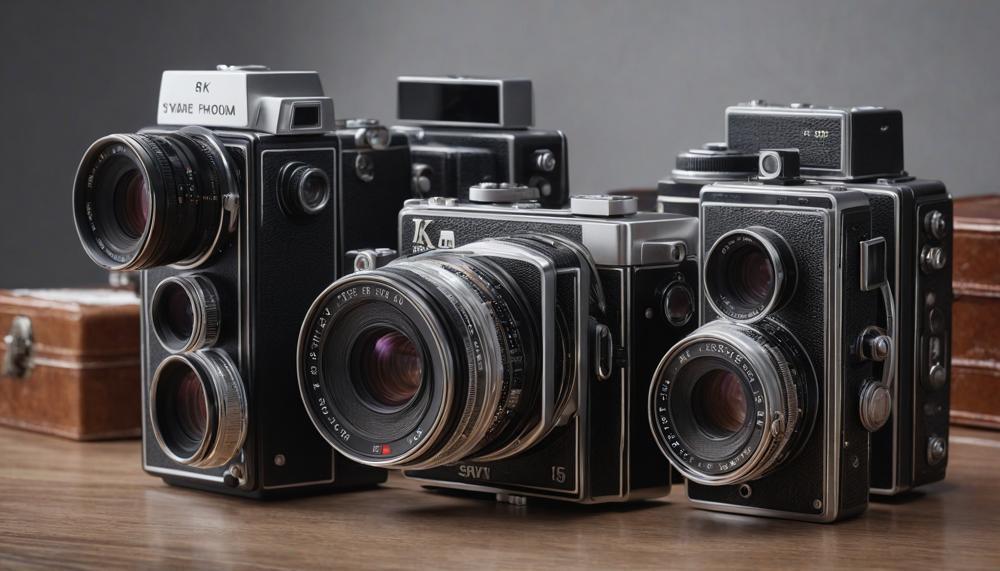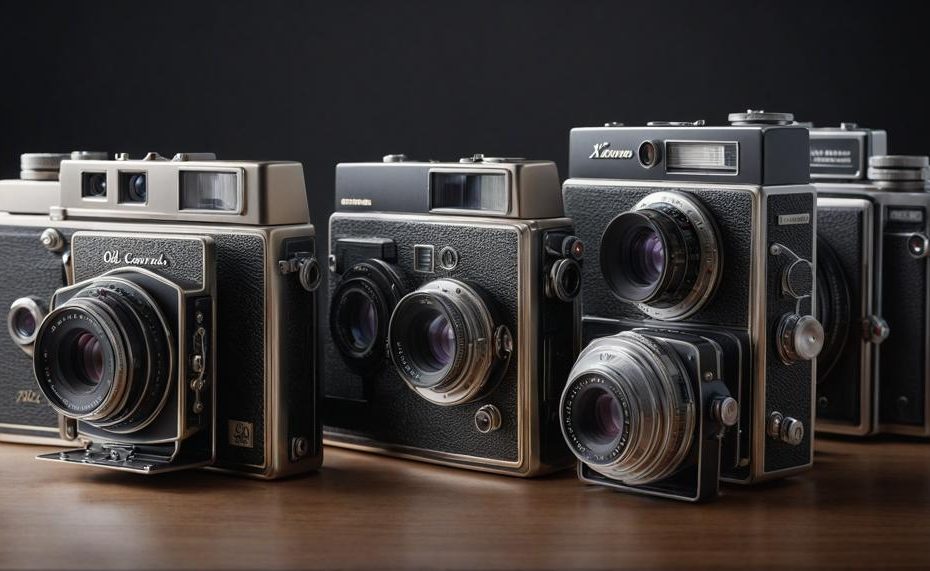Got an old camera gathering dust in the closet? Don’t just toss it in the trash. Properly disposing of your old camera is not only an environmentally responsible choice but also a great way to give back to the community or even earn a little extra cash.
Here’s why you should care and what you can do:
Why Proper Disposal Matters
- Environmental Impact: Cameras and their batteries contain toxic substances that can harm the environment if not disposed of correctly.
- Resource Recovery: Digital cameras have valuable materials that can be reclaimed and reused, reducing the need for new resources.
- Community Benefits: Donating your old camera can help others, such as schools or nonprofit organizations, that can make good use of it.
Key Takeaways
- Resell: While the resale value might be low, there are platforms where you can sell your old cameras, providing them a second life.
- Reuse for Parts: Salvageable parts can be used to repair other devices, keeping more electronics in circulation and reducing waste.
- Donate: Many organizations will gladly accept old cameras, which can be valuable tools for education and creativity.
- Recycle: Avoid the landfill by taking your camera to a recycling center where it can be properly handled.
By choosing one of these methods, you’re not only keeping your space tidy but also making a positive impact on the environment and helping others. So next time you find an outdated gadget, remember there are better options than the trash bin.
Contents
Sell your old cameras and lenses
The best options for selling old cameras and lenses depend on the type of equipment and the desired speed of sale. Here are some prime choices:
| Method | Details | Pros and Cons |
| KEH | KEH is a leading platform for buying and selling used photography gear. They offer competitive rates and expert assistance. | Pros: Easy process, expert valuation, competitive pricing. Cons: Might offer lower prices compared to private sales. |
| BandH Photo Video | Trade-in your old gear for cash or store credit. Ideal for quick transactions. | Pros: Quick and straightforward, reliable. Cons: Lower payout compared to private sales. |
| Local Camera Shops | Especially good for selling vintage or antique cameras. | Pros: Personal service, immediate payout. Cons: Not interested in modern, less valuable equipment. |
| Online Marketplaces | Platforms like eBay, Craigslist, and Facebook Marketplace allow for direct sales to buyers. | Pros: Potential for higher profits, wide audience. Cons: Requires effort in listing and managing sales, possible scams. |
| Lomography Enthusiasts | Communities interested in old digital cameras for creative purposes. | Pros: Niche market, good for specific types of cameras. Cons: Limited audience, variable interest. |
For additional insights, consider reading more about recycling electronics responsibly and finding specialized recycling centers in your area. Remember, each method has its unique advantages and challenges.
Donate your old cameras and lenses
Donating old cameras and lenses brings numerous benefits to both the environment and the community.
Environmental Benefits
- Reduces Electronic Waste: Donating cameras and lenses keeps them out of landfills, significantly reducing the volume of electronic waste. Electronics contain harmful chemicals that can leach into the soil and water, causing environmental damage.
- Conserves Resources: Reusing cameras and lenses lessens the demand for new products, saving raw materials and energy required for manufacturing. This conserves valuable resources and reduces the carbon footprint associated with production and transportation.
- Promotes Sustainable Practices: Encouraging donation over disposal fosters a culture of sustainability. By reusing and recycling electronics, we adopt more environmentally friendly practices that can inspire others to follow suit.
Community Benefits
- Supports Education: Donated cameras and lenses can be used in schools, colleges, and community centers, providing valuable learning tools for photography and media courses. This enhances educational opportunities, especially in underfunded institutions.
- Empowers Nonprofits: Many nonprofits use photography to document their work, create awareness, and generate support. Donated equipment helps these organizations operate more effectively without straining their limited budgets.
- Enriches Creative Projects: Local artists, budding photographers, and community projects can benefit from the availability of high-quality equipment that they otherwise might not afford. This can boost local art scenes and foster creativity.
Practical Steps for Donating
To ensure your donation has the greatest impact, consider the following steps:
| Step | Description | Example Organizations |
| Identify Suitable Recipients | Look for schools, community centers, and nonprofits that can make use of your equipment. | Schoolhouse Connection, Kiva |
| Check Equipment Condition | Ensure the cameras and lenses are in good working order. Clean and test them before donating. | |
| Contact Organizations | Reach out to potential recipients to understand their needs and how your donation can help. | |
| Arrange Delivery | Organize the logistics of getting the equipment to the chosen organization, considering shipping or drop-off options. |
Give away your old cameras and lenses

Giving away your old cameras and lenses can be done in several responsible and environmentally-friendly ways. Here are some options:
| Option | Details | Example |
| Donate to Schools and Colleges | Supports educational programs by providing students with quality equipment | Contact local high schools or community colleges |
| Support Nonprofit Organizations | Helps nonprofits document and share their work effectively | PhotoVoice |
| Give to Art and Youth Programs | Enables creative projects and educational activities for young artists | Reach out to local art centres or youth clubs |
| Recycle through E-Waste Programs | Ensures responsible disposal and recycling of old equipment | Call2Recycle |
| Sell or Trade-In for New Gear | Provides an opportunity to upgrade while ensuring reuse or recycling | BandH Photo Video |
| Community Sharing and Gifting | Connects your old gear with someone who can make good use of it | Freecycle |
Keep your old cameras and lenses
Keeping your old cameras and lenses offers a multitude of benefits that go beyond the immediate thought of disposal. Here are some compelling reasons to consider preserving your photographic equipment:
Nostalgia and Sentimental Value
Old cameras often hold a deep sentimental value, capturing not just images but memories of significant life events. These devices can be treasured keepsakes that remind you of your photographic journey and milestones.
Unique Artistic Effects
Vintage lenses have distinctive characteristics that can’t be replicated with modern equipment. They offer unique bokeh, flare, and colour rendering, which can add a special touch to your photos. Many photographers cherish these imperfections for their creative potential.
Backup Equipment
Having a backup camera and lenses can be a lifesaver during shoots. If your primary equipment fails, your old gear can serve as a reliable fallback, ensuring you never miss capturing important moments.
Cost Savings
Instead of spending money on new equipment for secondary or risky shoots (like underwater or extreme sports), using your old gear can be a cost-effective solution. This approach reduces financial pressure while still allowing you to experiment with your photography.
Educational Tools
Old cameras are excellent tools for learning and teaching. They can help new photographers understand the basics of photography, including manual settings, film development, and the mechanics of cameras.
Sustainability
Keeping and using old cameras contributes to sustainability by reducing electronic waste. Every piece of equipment saved from the landfill helps mitigate environmental impact.
Recycle your old cameras and lenses
Properly recycling old cameras and lenses helps to reduce e-waste and environmental impact. Here are some effective methods:
| Method | Details | Benefits |
| E-Waste Facilities | Dispose of electronic waste at specialized facilities. | Prevents harmful substances from entering the environment. |
| Recycling Programs | Participate in take-back programs by manufacturers or third-party services. | Ensures responsible recycling and material recovery. |
| Repurposing | Donate or sell to schools, clubs, or charities. | Extends equipment life and benefits others. |
| Sustainable Accessories | Support eco-friendly products and materials. | Promotes a greener photography industry. |
| Battery Recycling | Recycle used batteries at designated points. | Reduces battery waste and environmental impact. |
| Eco-Friendly Brands | Choose brands with sustainable practices. | Supports environmentally conscious companies. |
| Proper Care | Maintain equipment to extend its lifespan. | Delays disposal and reduces e-waste. |
Conclusion
Don’t let old cameras gather dust in your closet; find them a new purpose instead. Disposing of old cameras thoughtfully not only benefits the environment but can also be a rewarding endeavor. Cameras and their batteries contain harmful substances that shouldn’t end up in landfills.
By recycling, valuable materials can be reclaimed, reducing the need for new resources. Plus, donating old cameras can support educational and nonprofit organizations, sparking creativity in others.
Several avenues can give your old camera a second life:
- Reselling: Platforms like KEH and BandH Photo Video make it easy to sell used cameras, although they might offer lower prices compared to private sales. For a potentially higher return, online marketplaces like eBay or Facebook Marketplace are excellent options.
- Reusing for Parts: Salvageable parts can repair other devices, keeping more electronics in use and reducing waste.
- Donating: Schools and nonprofits often welcome old cameras, providing them valuable tools for learning and creativity.
- Recycling: Many recycling centers can properly dispose of your camera, ensuring harmful substances are safely managed.
Choosing any of these methods not only declutters your space but also contributes positively to the environment and community.





